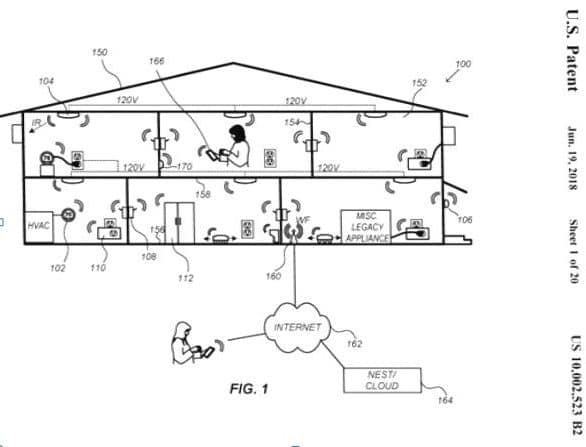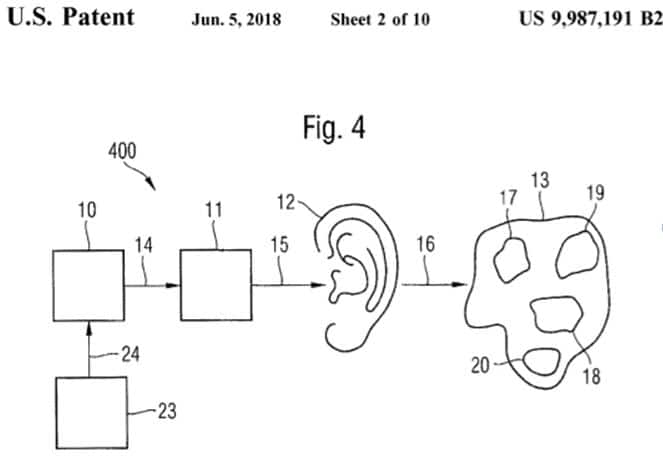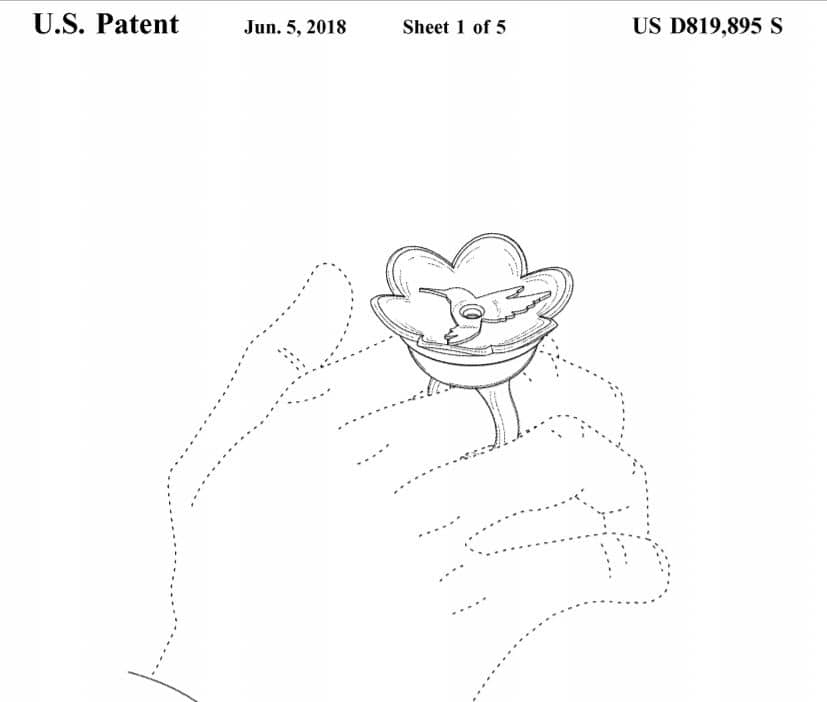The patent list continues to lean in on ear devices that use the ear as a conveyor belt for things far beyond what audiologists used to think of as hearing “better.” They raise Artificial Intelligence (AI) and Machine Learning (ML) questions about what “better” may mean as technology continues to unfolds. The following are June’s examples of running the “better” gauntlet.
Please Control Your Air Guitar
Intel Corporation’s patent #9996162 sounds like something out of a Harry Potter book. It casts a “personal magnetic field” around the wearer, which not only follows the wearer around but “overpower(s) adjacent interfering fields” in its path. Ominous as that sounds, the principal proposed application is charming: specific gestures are identified to produce musical elements through a speaker, while allowing the gesturer a high degree of personal freedom in performing the gesture to achieve tone, pitch, tempo, etc effects.
“Thus a user may perform a musical score without necessarily having an instrument, and may seem to generate music “out of thin air.”
Event marketers are probably already contemplating karaoke/air guitar competitions. But hearing healthcare may be thinking of personal and automatic aural translation of sign language.
Please Control Your House and Devices

Fig 1. Google house hazard alarm system
Google knows what goes on in our houses and it worries. Hence, its patent #10002523 identifies possible home dangers and sends us audible “pre-alarm speech(es)…that warn of a developing hazardous condition.” (see Fig 1).
Well! Who among us is not already annoyed by alarms, bells and whistles emanating from the phones of others in public places? Who among us isn’t already in a permanent hyper-vigilant state from random phone pings? Are we eager to add speaker-born warnings of”pre-alarm”conditions from every room in everyone’s houses to our already-crowded auditory milieu? Then again, we do want to know if things are amiss in our own homes.
EarLens is on it in their patent #10003877, with
“devices and systems [that] have an advantage of providing sound to user from the audio signal … without creating sound that can be perceived by others.”
Besides considering the comfort of others, the EarLens contribution will afford us some privacy at least, if not peace and quiet.
Please Control Your Neuronal Enthusiasm

Fig 2. Neural stimulation patent 9987191
Patent #9987191 from University of Cologne aims to desynchronize pathologically synchronized firing of neuronal populations by resetting the phase of activity in selected neuronal sub-populations. The reason for doing so is to interrupt brain diseases characterized by “excessively strong neuronal activity in a number of neurological and psychiatric diseases… [which]… have a very strong negative influence on the cerebral function.”
The inventors focus on tinnitus as a disease of this type. Their device (Fig 2) delivers multi-frequency auditory signals as desychronizing stimuli. Presumably box 11 in Fig 2 can take many forms, including an in the ear device.
Enough About Ears, Time for Summer Relaxation

Fig 3. Feeding the hummers patent #D819895
When your tinnitus and constantly-pinging phone get you down, when your personal magnetic air guitar cloak has worn you out, it’s time to lie down on that lounge chair by the pool and take a nap. Don’t forget to don your wearable hummingbird feeder before drifting off.
The June List
|
Description |
Patent Number |
Assignee |
Issued |
|
Device and method for auditory stimulation |
9987191 |
Forschungszentrum Juelich GmbH (Juelich, DE) |
6/05/2018 |
|
Controlling ear stimulation in response to electrical contact sensing |
Elwha LLC (Bellevue WA) |
6/05/2018 |
|
|
Audio signal encoding and decoding based on human auditory perception eigenfunction model in Hilbert space |
NRI R&D Patent Licensing, LLC (San Antonio, TX) |
6/05/2018 |
|
|
Method of operating a hearing aid system and a hearing aid system |
Widex A/S (Lynge, DK) |
6/05/2018 |
|
|
Hearing aid system and a method of operating a hearing aid system |
Widex A/S (Lynge, DK) |
6/05/2018 |
|
|
Hearing assistance system incorporating directional microphone customization |
Starkey Laboratories, Inc. (Eden Prairie, MN) |
6/05/2018 |
|
|
Method of optimizing parameters in a hearing aid system and a hearing aid system |
Widex A/S (Lynge, DK) |
6/05/2018 |
|
|
Binaural hearing system configured to localize a sound source |
Oticon A/S (Smorum, DK) |
6/05/2018 |
|
|
ITE hearing aid and method of manufacturing the same |
Sonova AG (Staefa, CH) |
6/05/2018 |
|
|
Ear model unit, artificial head, and measurement device and method using said ear model unit and artificial head |
Kyocera Corp (Kyoto, JP) |
6/05/2018 |
|
|
Ear cleaning device |
Nupur Technologies, LLC (Buffalo, NY) |
6/12/2018 |
|
|
Collision avoidance using auditory data |
Ford Global Technologies, LLC (Dearborn, MI) |
6/12/2018 |
|
|
Wearable sensor system for providing a personal magnetic field and techniques for horizontal localization utilizing the same |
Intel Corporation (Santa Clara, CA) |
6/12/2018 |
|
|
Middle ear transducer with biocompatible implantable adhesive pad |
Med-El Elektromedizinische Geraete GmbH (Innsbruck, AT) |
6/12/2018 |
|
|
Visual and auditory user notification methods for smart-home hazard detector |
Google LLC (Mountain View, CA) |
6/19/2018 |
|
|
Portable, wearable radio |
Motorola Solutions, Inc. (Chicago, IL) |
6/19/2018 |
|
|
Contact hearing system with wearable communication apparatus |
EarLens Corporation (Menlo Park, CA) |
6/19/2018 |
|
|
In-the-ear earphone, its variations and methods of wearing the earphone |
Applicant: Ushakov, Alexey Leonidovich (Moscow, RU) |
6/19/2018 |
|
|
Power management system for a hearing aid |
GN Hearing A/S (Ballerup, DK) |
6/19/2018 |
|
|
Systems and methods for altering the input dynamic range of an auditory device |
Cisco Technology, Inc. (San Jose, CA) |
6/19/2018 |
|
|
Method for operating a binaural hearing system and binaural hearing system |
Sivantos PTE, Ltd. (Singapore, SG) |
6/19/2018 |
|
|
Hearing device interface |
Oticon A/S (Smorum, DK) |
6/19/2018 |
|
|
Wearable defibrillator with audio input/output |
Zoll Medical Corporation (Chelmsford, MA) |
6/26/2018 |
|
|
Hearing system for estimating a feedback path of a hearing device |
Oticon A/S (Smorum, DK) |
6/26/2018 |
|
|
Cochlear hearing device with cable antenna |
Oticon A/S (Smorum, DK) |
6/26/2018 |
|
|
Hearing device including antenna unit |
Oticon A/S (Smorum, DK) |
6/26/2018 |
|
|
Bone conduction device having magnets integrated with housing |
Cochlear Ltd (Macquarie University, AU) |
6/26/2018 |
|
|
Ear protection device |
DiPiazza, Concetta (Brooksville, FL) |
6/26/2018 |
|
|
Ear defender |
JSP Limited (Oxford,d GB) |
6/26/2018 |
Editor’s note: Interested readers can click the following links for patents approved in May 2018, April 2018, Q1 2018, Nov/Dec 2017, October 2017, September 2017, August 2017, June/July 2017, May 2017, April 2017, March 2017, February 2017, January 2017, December 2016, November 2016, October 2016, Sept 2016, Jul/Aug 2016, May/Jun 2016, Mar/Apr 2016, Jan/Feb 2016, Nov/Dec 2015, Sept/Oct 2015, Jul/Aug 2015, May/Jun 2015, Mar/Apr 2015, Jan/Feb 2015, Nov/Dec 2014, Sep/Oct 2014, July/Aug 2014, May/Jun 2014, Mar/Apr 2014, Jan/Feb 2014, Nov/Dec 2013, September/October 2013, Jul/Aug 2013, May/Jun 2013, Mar/Apr 2013, Jan/Feb 2013, Nov/Dec 2012
 Holly Hosford-Dunn, PhD, owned and operated a dispensing audiology practice in Tucson and was active in management of HearingHealthMatters.org through 2017. She holds BA degrees in Communication Sciences, Psychology and Economics; MA in Communication Disorders; PhD in Hearing Sciences. Following post-doctoral work at Max Planck Institute (Munich, DE) and Eaton-Peabody Auditory Physiology Lab (Boston), she joined the Stanford medical school faculty as director of audiology. She has authored/edited numerous text books, chapters, journals, and articles and taught Marketing and Practice Management in a variety of academic settings. She continues to consult and write on topics related to hearing health care vis-à-vis consumer demands, professional training, technological advancement, capital investment, industry consolidation, regulatory control, product and service distribution, and strategic pricing.
Holly Hosford-Dunn, PhD, owned and operated a dispensing audiology practice in Tucson and was active in management of HearingHealthMatters.org through 2017. She holds BA degrees in Communication Sciences, Psychology and Economics; MA in Communication Disorders; PhD in Hearing Sciences. Following post-doctoral work at Max Planck Institute (Munich, DE) and Eaton-Peabody Auditory Physiology Lab (Boston), she joined the Stanford medical school faculty as director of audiology. She has authored/edited numerous text books, chapters, journals, and articles and taught Marketing and Practice Management in a variety of academic settings. She continues to consult and write on topics related to hearing health care vis-à-vis consumer demands, professional training, technological advancement, capital investment, industry consolidation, regulatory control, product and service distribution, and strategic pricing.






